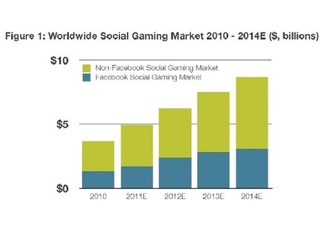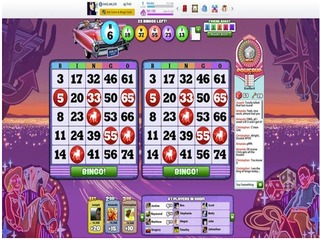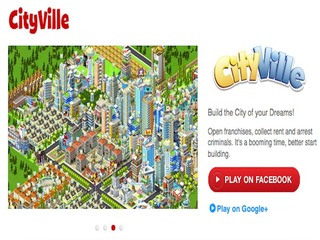
Gaming creators at Mob Science zero in on $1M seed fund
One of the first third-party developers signed up for the Zynga Platform gets seed funding

Social gaming developing company Mob Science announced a $1 million round of seed funding on Tuesday. This investment came from tech veterans David Young (CEO of Joynet) and Mark Surfas (founder of GameSpy Industries.)
Since Mob Science is one of a handful of outside developers working on the newly unveiled Zynga Platform, this funding will help Mob Science promote their new role-playing game to the 240 million monthly active users tied into the Zynga community. Mob Science already runs several Facebook titles including in Coffee Bar, Snowball Fight, Famous Anarchy, and Willy’s Sweet Shop. The new role playing gaming they are working on will be one of the first third-party apps published across Zynga’s network.
Michael Witz, founder and CEO of Mob Science, brought the company onto the Facebook gaming platform in 2008 and has remained bootstrapped until now.
Mob Science also recently signed a lease to move to Carlsbad, Calif. as the company transitions for more growth and product development.
Witz believes that the its next game is the company's most ambitious game yet and has the potential to really virally penetrate the new Zynga Platform.
As part of the deal, Joynet CEO David Young will join Mob Science’s board of directors. Young co-founded Joyent in 2004 and grew the company into a global provider of cloud computing and software systems.
As the gaming industry continues to experience a huge shift in how and where games are played and distributed, companies like Mob Science are seeing the limitless potential they have in reaching users that can draw in their friends and families across the globe.
Other investors include in Mob Science Jason Hoffman, co-founder and CTO of Joyent; Brian Brown, executive vice president of corporate development at Joyent; and Steve Tuck, general manager of Joyent Cloud at Joyent.
Currently, Mob Science has had 50 million install its gaming applications. This move to expand on its Facebook-dominent focus is a great move for the gaming company, especially as Zynga continues to prove its dominance in the social gaming marketplace.
How the Zynga Platform works
This new platform was a move for Zynga to start asserting its independence from Facebook and offer a way for social gamers to communicate and play with other social gamers.
Part of this platform design was to also license access to the Zynga Platform so that smaller developers and gaming companies can get published and promoted in the Zynga network.
Zynga will also enable partners to tap into channels and features that increase social engagement, analytics that measure and drive social, and back end technology that ensures scalability and availability.
This new partnership is focused on accelerating the growth that Konami, Playdemic and Rebellion will experience -- because if Zynga knows anything, its how to create accelerated growth.

Zynga originally announced its intent to launch an independent platform filled with the virtual world-building, poker, and word games that built Zynga back in October and then last week reminded the public that the new platform was imminent and now it is here.
Even the anticipation of this new platform caused Zynga shares to spike on Friday to $15.41, up 7%. That was the highest its traded since its IPO debut on December 16, and extends its rocket-ship ride of 11% in trading last week, on news the company's stand-alone platform is around the corner.
When Zynga went public in December, we all learned that more than 90% of Zynga's $828.9 million revenue (in 2011) was coming from Facebook. That means the company could have made $1.15 billion if it wasn't cutting Facebook in on its credits. But then you would have to see how many people would play Zynga games if they had to create all new profiles and manually search fro people they know -- probably only a fraction.
And Facebook proved just how much it needs the Zynga dollars when it released some of its financials at the start of 2012 with its IPO papers. Zynga accounted for 12% of the Facebook revenue. Yikes. So maybe neither company wants to live too far apart in this symbiotic relationship.
But this doesn't mean that the new platform lacks new revenue opportunities.
Zynga is hoping that it can boast new revenue as a licenser and host of third-party apps in order to show continued opportunities for growth -- especially outside the Facebook system.
Zynga will also use a function called zCloud to help the games from smaller developers skyrocket based on demand, rather than being held back by infrastructure (which many have criticized Facebook for). Developers that have already signed up for as Zynga Platform partners including Mob Science and Row Sham Bow.
The games currently available on the platform are: CastleVille, Words With Friends, CityVille, Hidden Chronicles and Zynga Poker. More third-party games will also be available soon.
Zynga has engineered the game site for speed, so those that have criticized the Facebook gaming speed will enjoy how quickly they level-up and move through challenges.
The play service will be available in 16 languages, including: English, French, Italian, German, Spanish, Portuguese, Turkish, Indonesian, Norwegian, Danish, Dutch, Swedish, Traditional Chinese, Korean, Japanese and Thai.
It will be interesting to see if more young third-party developers will want to jump on the Zynga Platform, not just to gain the visability from users but also to excite possible investors looking for early-stage funding opportunities.
Related Companies, Investors, and Entrepreneurs
Zynga
Startup/Business
Joined Vator on
Zynga is the largest social gaming company with 8.5 million daily users and 45 million monthly users. Zynga’s games are available on Facebook, MySpace, Bebo, Hi5, Friendster, Yahoo! and the iPhone, and include Texas Hold’Em Poker, Mafia Wars, YoVille, Vampires, Street Racing, Scramble and Word Twist. The company is funded by Kleiner Perkins Caufield & Byers, IVP, Union Square Ventures, Foundry Group, Avalon Ventures, Pilot Group, Reid Hoffman and Peter Thiel. Zynga is headquartered at the Chip Factory in San Francisco. For more information, please visit www.zynga.com.

Mark Pincus
Joined Vator on
Related News


Social gaming ad spending soaring to $220M

Facebook isn't going to dominate social gaming

Zynga adds three game developers to new platform

Social gaming: Show me the money

Zynga adds themed Bingo to its casino games

